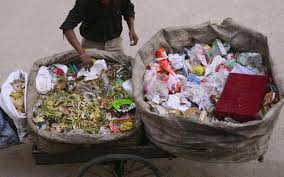Swachhta rankings exposed the problem of waste segregation in the national capital city. Delhi has performed poorly in the matter. The students and professors of Delhi University did a study to analyze the reasons. The result suggests that behavioral aspects along with various other factors affect the waste segregation in the city.
The students of Sri Guru Gobind Singh College of Commerce (SGGSCC) planned to conduct this study with the help of associate professor Dr. Paramjeet Kaur and assistant professor Dr. Harpreet Kaur. The research area covered 64 societies in model wards of Rohini and Prashant Vihar, which includes 708 households.
The study named ‘Desperate call for an exigent focus on waste segregation’ discards the idea of blue-green bin differentiation for disposal of waste. It marks this differentiation as not necessary. Moreover, the educational factor seems redundant as 47% of households that do not practice waste segregation are literate enough to have postgraduate or other professional degrees.
Further, facts depict that people don’t want to spend on waste segregation. 90% of households are included. The reason being the lack of trust in the municipal collectors. The detailed study shows the percentage distribution of wet and dry waste which is 79% and 21% respectively. Moreover, around 60% of dry waste can be considered harmful as it included diapers and sanitary napkins. It has to be mentioned that 2.6-3.3% of the total solid waste was plastic.
NEW SOLID WASTE MANAGEMENT INITIATIVES INTRODUCED TO MAKE CLEANER
The report says that merely placing different colored dustbins doesn’t make an ideal solution. The bins are placed in all societies but the purpose is not served. It’s astonishing that in 75% of houses, in the model ward area waste segregation is a distant idea. The study recommends the placement of activators for the treatment of waste. Composing material can be distributed to the households. It can prove to be more beneficial than the blue-green bins, report says.
Waste pickers can be employed in societies. They can collect the waste which is segregated and perform other treatment procedures on it. Then every week, external agencies can move it to the recycling units. Moreover, an innovative idea was given by the team of researchers that a ‘social impact’ project can be introduced in the education policy. To bring a change this project could be made compulsory.
Solid waste management is mandatory in the capital city as of 2017. However, waste management failed miserably in Delhi. With waste production of more than 10,000 tones every day, it should be a matter of huge concern for the city administration. Additionally, around 85% of households in the model ward are aware of different types of wastes.
IGNOU ROLLS OUT CERTIFICATE PROGRAMME IN SOLID WASTE MANAGEMENT
Approximately 23% of the 262 households who had qualifications greater than graduation did not practice waste segregation. The relationship between education and awareness seems unsatisfactory.
Another interesting fact is that among the ones practicing waste segregation, retired persons hold a major part of it. They can help in promoting the practice among the younger generation.
The report says that willingness to make an effort towards waste segregation is missing.












